
ABC, NBC Censor Largest Native Mobilization In Decades Against Dakota Access Pipeline
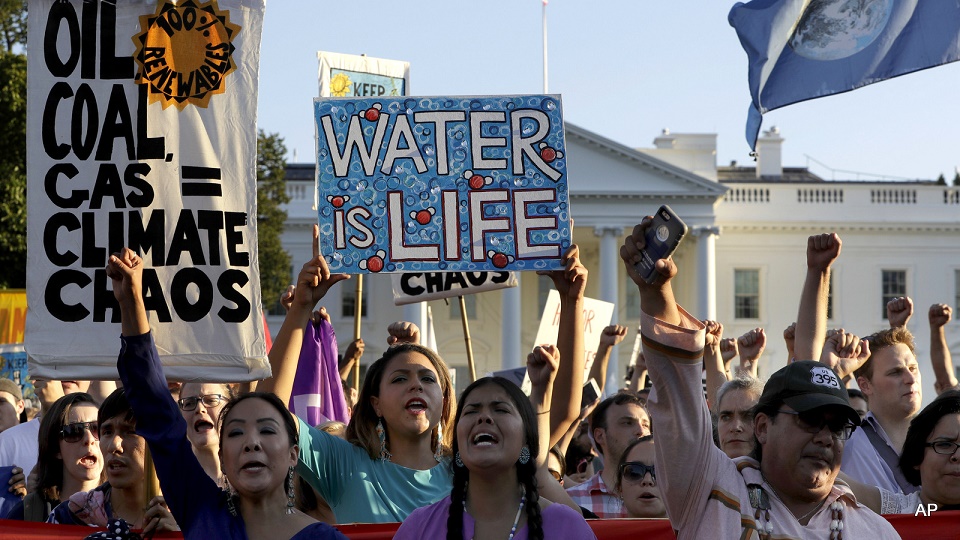
Native nations across the continent sign a new treaty opposing oilsands expansion as anthropologists, historians and museums condemn destruction of Sioux sites, but you wouldn’t know it from the mainstream media.
mintpressnews.com reports:
As thousands of supporters around the world have joined demonstrations in solidarity with Native land and water defenders blocking the planned Dakota Access pipeline near the Standing Rock Indian Reservation in North Dakota, the largest Native mobilization in decades remains absent from some of the biggest news media in the United States.
Jim Naureckas, editor of the media watchdog site FAIR.org, released a report on Thursday which noted that "to this day, ABC News and NBC News have yet to broadcast a word about the pipeline struggle.”
Among the "Big Three” television networks, CBS first broached the story on Sept. 5, in "a lone report on CBS Morning News (9/5/16), amounting to 48 words read at 4 o’clock in the morning,” although Naureckas found the channel has since "returned to the story repeatedly.”
While other news channels, including MSNBC, CNN, PBS, and even Fox News, have reported the standoff, none have mentioned Democracy Now! host Amy Goodman’s threatened arrest for "criminal trespass” while covering attacks on protesters by Dakota Access-contracted security guards using dogs and pepper spray on Sept. 3.
In earlier analysis, released on Sept. 15, Naureckas noted the media’s broad lack of attention to the State of North Dakota’s "extraordinary action” against a fellow journalist.
"[M]ost national corporate media outlets—the ones who complain about not getting a seat on a candidate’s plane—breathed not a word on North Dakota’s assault on the press’s ability to cover a major story of the moment,” he wrote.
But even as some of the largest news outlets in the United States continue to ignore the Native and solidarity protesters blocking the pipeline’s construction, hundreds of protests in solidarity with them have united thousands of supporters around the world.
On Sept. 13 alone, over 200 actions occurred, according to 350.org.
"From banner-drops in California to main-street rallies in small Midwest towns, to actions as far afield as London and Hawaii — this movement truly came together to #StandWithStandingRock,” the climate activist network said in an email to supporters.
It added that the "week’s largest rally, in Washington, DC, had over 3,000 people calling on President Obama to stop the pipeline.”
‘Keep fossil fuels in the ground’
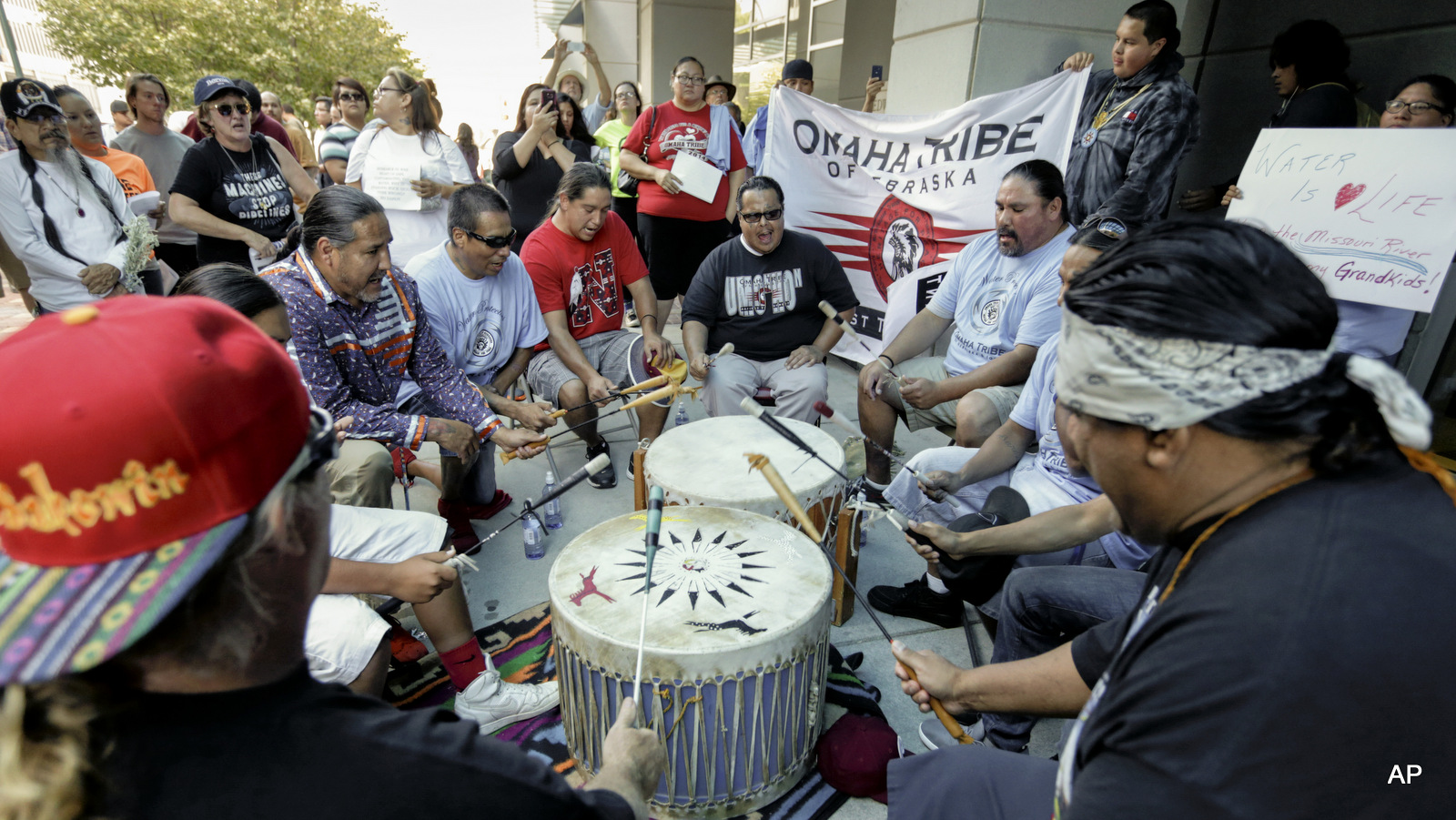
Native nations across the continent sign a new treaty opposing oilsands expansion as anthropologists, historians and museums condemn destruction of Sioux sites, but you wouldn’t know it from the mainstream media.
mintpressnews.com reports:
The day of protests fell during several weeks of global action coordinated by Red Warrior Camp, one of the encampments standing in the pipeline’s path.
"It’s important that the world understands this fight is about much more than stopping just one oil pipeline,” Kandi Mossett of the Indigenous Environmental Network, an organizer of the #NoDAPL movement, said in a statement emailed to MintPress News.
"It’s about all of us standing together from the North to the South and around the world to keep fossil fuels in the ground and create a just transition to a renewable energy economy.”
Hundreds more protests coordinated by the campaign took place globally between Sept. 3 and 17. Many targeted three of the banks–Citigroup, Mizuho and TD–financing the pipeline’s construction, while others, in Los Angeles and New York, focused on British-Danish security giant G4S, one of the companies contracted by Dakota Access to guard the pipeline.
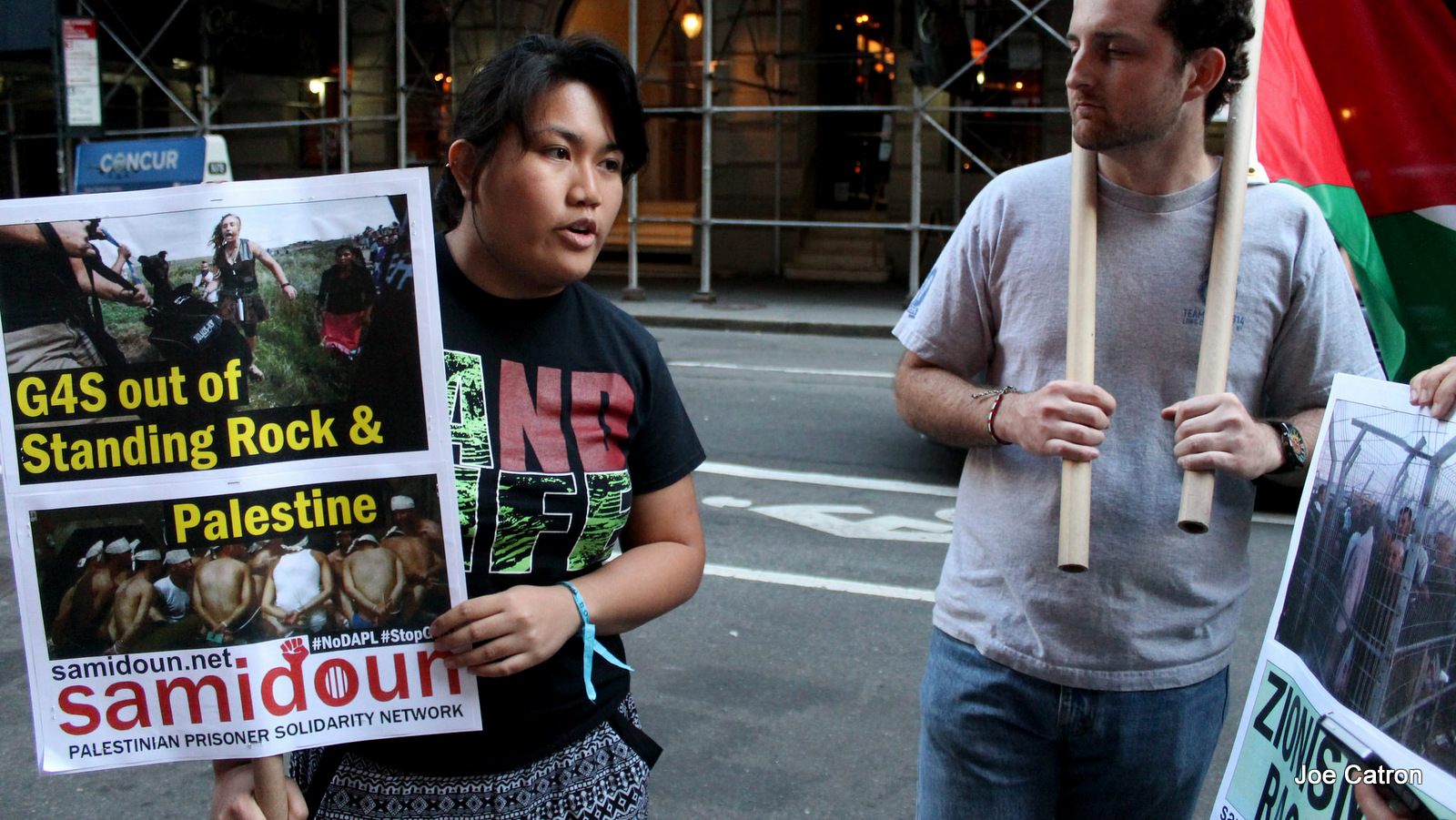
Activists rallied outside of the Manhattan, New York office of British-Danish security conglomerate G4S, before marching twice through the building’s lobby, to protest the company’s services to the Dakota Access Pipeline and Israel’s prison system on Friday, September 16, 2016.
‘Indigenous people are often made invisible’
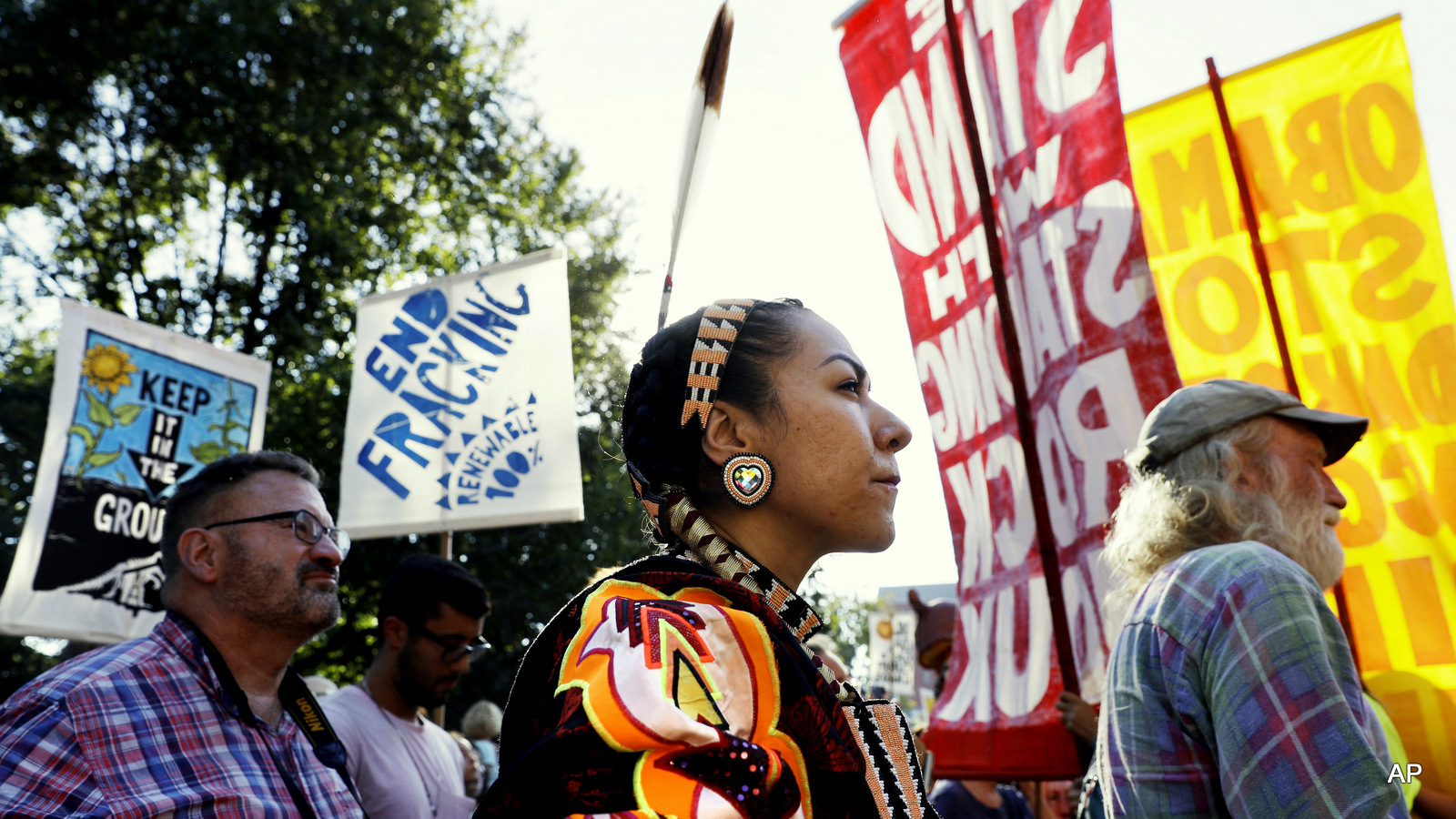
Angela Miracle Gladue, center, a member of the Frog Lake First Nations, a Cree community in Edmonton, Alberta, Canada, attends a rally in support of the Standing Rock Sioux Tribe and in opposition of the Dakota Access oil pipeline, in Lafayette Park near the White House, Tuesday, Sept. 13, 2016, in Washington.
Hundreds gathered in New York’s Union Square on Sept. 9, many carrying donations for Red Warrior Camp and another nearby gathering site, the Camp of the Sacred Stones.
"We collected ten bins of supplies to send to Standing Rock,” Anne Spice, a Tlingit member of Kwanlin Dun First Nation and doctoral student in anthropology at the City University of New York’s Graduate Center, told MintPress.
Spice, originally from Treaty 7 territory in Alberta, Canada, launched NYC Stands with Standing Rock, the group which organized the demonstration.
"Indigenous people are often made invisible in New York City, and so claiming space to stand in solidarity with Standing Rock was a really powerful statement,” she said.
"The atmosphere of the rally really reflected this.”
‘Every means necessary’
As demonstrations continue globally, many organizations have also sent delegations to Standing Rock in solidarity with its ongoing encampments.
"There are people there who have flown in from Ecuador, there are people from Massachusetts — all over,” Imani Henry, a Brooklyn resident and founder of Equality for Flatbush, a neighborhood group opposing gentrification and police violence, told MintPress.
Imani, who had just returned from Standing Rock, spoke with MintPress during a break in a meeting of the Brooklyn Anti-Gentrification Network on September 13.
"They’re going to use every means necessary, from civil disobedience to prayer, to stop this pipeline,” he said.
‘A struggle for future generations’
Other supporters have travelled much further, with one of the most notable delegations, a group of three indigenous leaders, hailing from the Ecuadorian Amazon.
Franco Viteri, Nina Gualinga, and Eriberto Gualinga, of the Kichwa community of Sarayaku, whose visit was coordinated by the support group Amazon Watch, arrived on Sept. 12.
"This is the struggle of the Sioux, as it is the struggle of other peoples on other continents: defending life and water,” Viteri, a former president of Confeniae (Federation of Indigenous Nationalities of the Ecuadorian Amazon), said in a statement emailed to MintPress.
"It is also a struggle for future generations against those who want to destroy life on this earth.”
‘Irreplaceable losses’
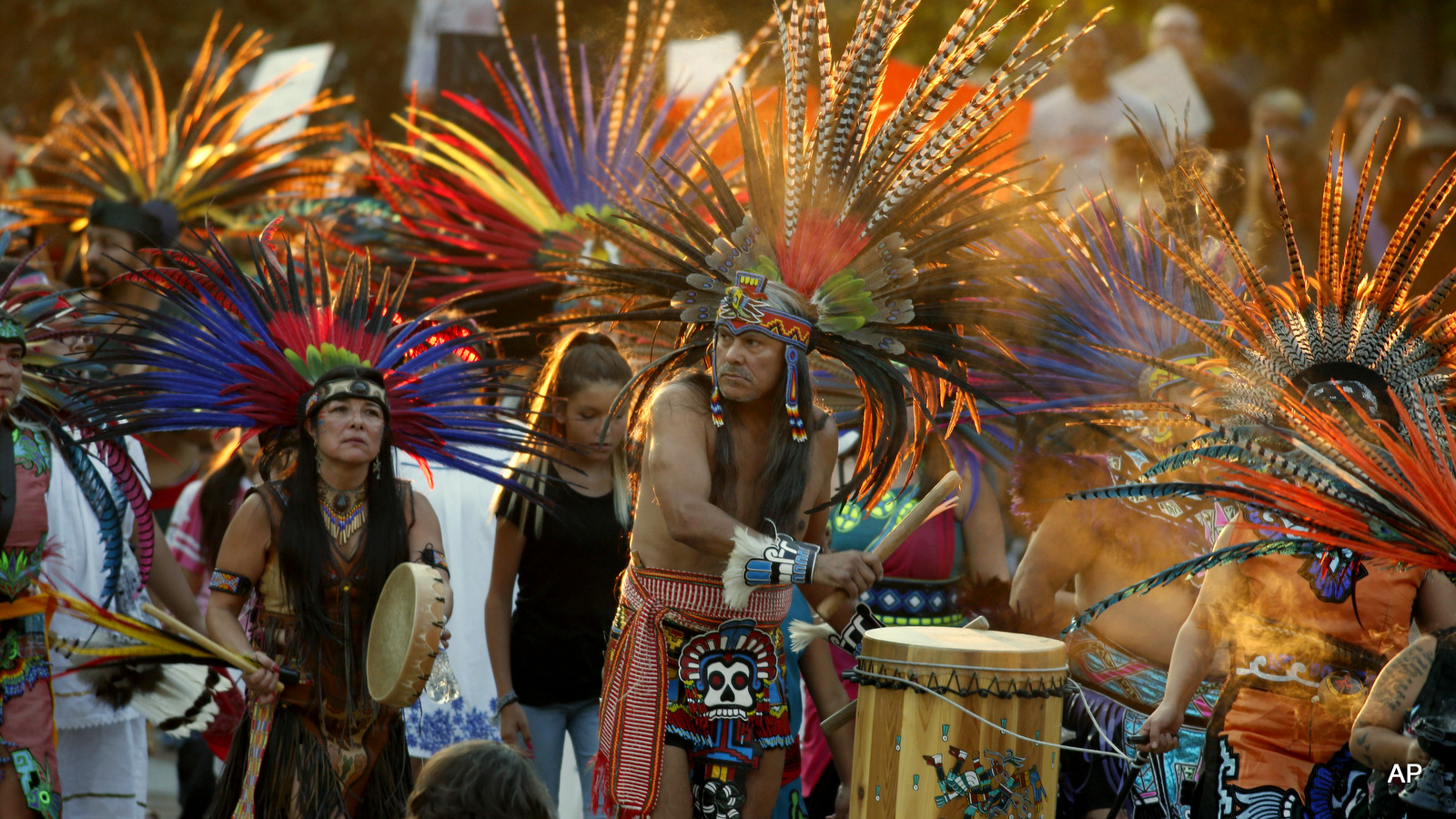
A line of protesters against the construction of the Dakota Access oil pipeline on the Standing Rock Reservation in North Dakota head to a unity rally on the west steps of the State Capitol late Thursday, Sept. 8, 2016, in Denver.
In the aftermath of a federal appeals court ruling which froze the pipeline’s construction near Standing Rock on Sept. 19, two new developments highlight the surging opposition to the project.
On Wednesday, more than 1,200 anthropologists, archaeologists, historians and museum workers released a statement denouncing Dakota Access, LLC’s destruction of Standing Rock Sioux burial grounds and sacred sites.
"The construction crews, flanked by private security and canine squads, arrived just hours after the Standing Rock Sioux tribal lawyers disclosed the location of the recently discovered site in federal court filings,” they wrote.
"We stand with the Standing Rock Sioux Tribe and affirm their treaty rights, tribal sovereignty, and the protection of their lands, waters, cultural and sacred sites, and we stand with all those attempting to prevent further irreparable losses.”
‘Unity and solidarity’
On Thursday, over 50 indigenous nations from across North America, including the Standing Rock Sioux, formalized a new treaty against oilsands expansion.
"Based on our sovereign, inherent right to self-determination, we have collectively decided that we will pick up our sacred responsibilities to the land, waters, and people,” Grand Chief Stewart Phillip of the Union of British Columbia Indian Chiefs said.
"We will come together in unity and solidarity to protect our territory from the predations of big oil interests, industry, and everything that represents.”
The Treaty Alliance Against Tar Sands Expansion, signed at simultaneous gatherings in Montreal and Vancouver, obligates its members "to work in collaboration with all peoples and all governments in building a more equitable and sustainable future, one that will produce healthier and more prosperous communities across Turtle Island and beyond, as well as preserve and protect our peoples’ way of life.”
The signatories hope "to develop a sustainable economy that does not marginalize our people,” Grand Chief Derek Nepinak of the Assembly of Manitoba Chiefs said.
"This is a time of great spiritual awakening for our peoples as we reinvigorate our Nations and ensure a better tomorrow for all.”















